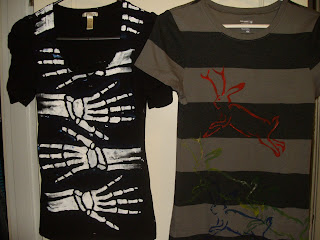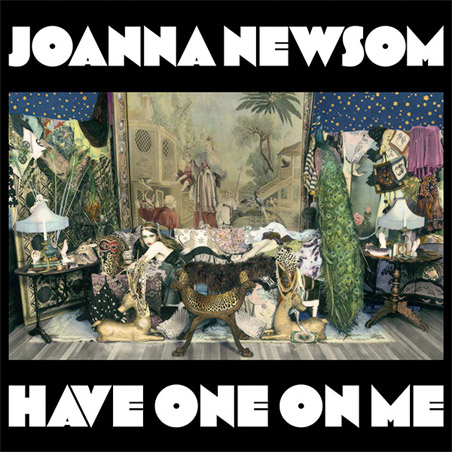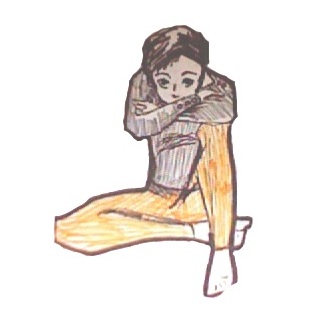I don't pretend to be a music critic, nor anyone who really knows that much about music in general. I was once told by someone in a band that they sort of hated people who gushed about music when they weren't actually musicians. But here I am, gushy gush.
Anyway, December is the time of year when we look back on the twelve months that were, and reflect. And though I can't think of that many positive world events (which I will probably delve more into later, though given my less than perfect blogging schedule, will not jot down on this or any site), films (the summer season was lackluster, at best; I was pleased at finally seeing The Girl With the Dragon Tattoo, though that's the only thing that really stands out for me), or television shows (The good is still good, and.... yeah), I can at least attest that it's been a damn good year for music.
How can I say that confidently? The same as anyone should. When I say "it's been a damn good year for music", what I mean is "it's been a damn good year for music that I like." Small-minded? Possibly. I have no problem with understanding how you might like something like Lady Antebellum or Taylor Swift or Katy Perry, because to each one's own (a response I like to call American Shruggism, which is what you get when someone says "whatever, man, it's a free country"). But I won't really be behind admitting that the release of these albums did anything to solidify 2010 as a good year in music, no matter how many undeserved Grammys they will, undoubtedly, win, as the former two examples are nominated for, like thirty awards.
Note to those who trust the Grammy awards to dictate the best of the best: don't. The Grammy award will go to the least innovative, smiliest, most likely to appeal to baby boomers nominee.
So anyway, my personal year in music has nothing to do with anyone else's year in music. I sounded off in reader polls, I've done my part. And now I have to think; do I send out recommends to other music-lovers? Just in case they've missed something? Though I am asserting my own individual taste in music, I'm sure my choices won't come as a shocker to that many people. And truthfully, I'm not going to be completely informed: I've never really listened to the The National. I don't like Sufjan Stevens. Such is life, such is taste, such is experience. That's how it works out.
Here's what I thought of my favorite music of 2010: badass. It made me want to assert myself and be happy and spend an entire day carrying a baseball bat over my shoulder just because I can. It was dark sunglasses and smirks. And when it wasn't that, it was sweet, and dreamy, and creative, and poppy. It was standing on the roof of a skyscraper during the day, where you can watch birds flutter by and write poetry and look over the beauty of the world. And it was standing on the same roof at night, when you're having a fantastic dance party, and it was standing on that roof a few hours later when everyone had danced themselves weary, and you can look over the city alone, and feel infinite possibility, and be Batman. Here's the soundtrack that makes that possible, broken down fairly easily:
If you're only gonna get a couple albums, get:
Titus Andronicus - The Monitor

I've already spent a little time discussing the garage-punk New Jersey team that has renewed my confidence in a genre that has, in my opinion, become too muddled by old rockers who won't leave and young rockers who prefer crying and tight pants and clichés to actually saying anything worthwhile. Patrick Stickles' Oberstian warble finds its place in a sound that somehow seems to be the true bastard great-grandchild of american folk. It's a sound of a snake growing out of the skin that it needs to shed but can't truly get away from. "I never wanted to change the world," he sings in "A More Perfect Union", "but I'm looking for a new New Jersey." The Monitor takes inspiration from the Civil War, but sounds hardly archaic, Stickles observes "you'll see blue trampling over grey, and green over brown" as though it is still happening in someone's backyard in Virginia. The conflict of blue and grey is a backdrop for conflicts that resonate long after the blood has dried in the battlefield; it seems eerily apropo that, at a time of Tea Partiers and divisions within political parties and unpopular wars and the growing gap between rich and poor, old and young, that the album would open with a quote from Honest Abe himself: "As a nation of free men, we will live for ever...or die by suicide." But a few pounding bars later, and ten drinks into the night, you find yourself crying out to another altruism, and finding delight in the Bacchanal brutality of American history: "Tramps like us, baby, we were born to die!"
Vampire Weekend - Contra

"Did he really just say 'I looked psychotic in a balaklava'?" a friend asked after hearing the opening lyric to Contra, Vampire Weekend's sophomore album. It sounded ridiculous. And it is. You almost want to hate Vampire Weekend for being such a Cupie Doll of an indie band (a title which I would only give to the likes of Sufjan Stevens). But then, you'd realize that you're hating them out of a Scrooge-like contempt for joyful things, and that Contra is, at its heart, a love letter from someone you met at summer camp years ago that you just rediscovered under your bed and are reading out on the porch, in the sun, probably drinking Horchata. It is brimming like a root beer float with afro-pop and M.I.A. samples. Contra is perfect, and it is unapologetically sincere. This is not music to be kept secret by those who covet so that their beloved bands won't sell out. The way I see it, a Vampire Weekend song on every radio. As ridiculous as it might be in its lyrics and its preciousness, there's no reason not to like it.
Kanye West - My Beautiful Dark Twisted Fantasy

Where to begin. In terms of entertainers, it may have been a year dominated by Kanye West; after retreating from the world in the shadow of his humiliating faux pas at the VMAs, West slowly re-emerged on Twitter, on the arm of a new model, and he began to show that he was not going to retreat and lick his wounds and never return. As followers of his website learned, he had been engineering an incredible ensemble album. The first single "Power" was released, and West reassured those who were hoping for great things: beneath a chanting chorus and a pounding beat, he rhetorically declared "How Ye doin'? I'm survivin'/I was drinkin' earlier, now I'm drivin'." "Power" proved to be the perfect song to introduce us to the songs that would soon compile Fantasy: as innovative as the promising music West produced before his rap career, as egotistic as the pink polo-wearing playboy on Graduation, but as self-aware and the autotuned mourner of 808s and Heartbreaks. Kanye West seems to have figured out his place as the 21st century celebrity, where it is impossible to hide from criticism even for a moment, where every mistake or act of stupidity might be broadcast within a few minutes. Instead of hiding like Michael Jackson or crying with anger against it, West has embraced the power that he has, and is nursing its potential as a tool to understand himself, rather than a mask that will destroy his humanity. "We found bravery in my bravado" he declares, and you realize that he's hit the nail on the head: that cockiness is douchey, yes, but it's also courageous in its own, dark way. It's the darkness that this album, as the title suggests, embraces: on "Monster", a song already famous for Nicki Minaj's schizophrenically perfect guest verse, the chorus declares to any naysayers: "I'mma need to see your fuckin' hands at the concert," daring them to criticize West for his music instead of his easily hated on public image. And, at least in this case, criticism seems difficult. If nothing else, he's put together an outstanding house band, with enough talent to make Quincy Jones' phone book seem scant. Bon Iver. Elton John. La Roux. Rhianna. Gone is the image of Kanye West as a rogue douchebag that no one will talk to because he was mean to poor Taylor Swift. This is a man who, apparently, does have all that power; and the best we can do is enjoy every damn second of it.
If you only want to hear a few songs, listen to:
Florence and the Machine - "Dog Days Are Over"
Florence and the Machine are up for a Best New Artist Grammy this year, and it'll be a shame to see them lose to Justin Bieber. Don't despair, though: because "Dog Days Are Over" might be the most uplifting song of the year, and in this recession, we need it. Light and flighty harps, soaring vocals, and a heart-pumping chorus that really does make you want to do that running-through-a-crowded-city-street-because-you-can thing.
Cee Lo Green - "Fuck You"
At last. Someone said it. And they said it with soul. As much as I like to be picky about good, deep lyrics, there's really nothing better than knowing that, instead of being Byronic about a lost love, you just want to go "Fuck you, and fuck her too." The censored, Gwenyth Paltrow version of the song has it as "Forget you", which is a bit too hopeful, suggesting that the act of forgetting someone is the best way to deal with the situation of feeling rejected. The truth is, it isn't. The best thing to do is to just say "fuck it," with anger and humor and hubris. This is the real message that every advice columnist should give but is too afraid to: if someone gets you down, they can go fuck themselves. It's a rejection song that serves as a realization of this freedom, and thus a celebration of it. And you'd better dance to it.
Janelle Monáe - "Tightrope"
It's nice when people are have fun that inspires you to have fun. I'm noticing that pretty much everything I'm listing on this post fills me with some sort of happy thought. No matter how depressing this year was, there was music that made me smile and bounce and know that I was going to get through it. And then there's this, introduced to me months ago but not really appreciated until recently for, shall we say, personal reasons. I'm too young to have any actual memory of James Brown at his heyday, but it had to be something like "Tightrope"-- you can almost hear the ghost of "Get Up (I Feel Like Being a) Sex Machine". And then Big Boi (who had a damn good year of his own) shows up and I'm fucking sold. And I have shoes that look like that, so, you know how it is.
Sleigh Bells - "Riot Rhythm"
I don't know if Sleigh Bells is for you. Sleigh Bells is what happens when you take airy electro-pop and bury it alive and it punches through its own coffin. Theirs is, in my opinion, the best debut of the year, Treats is abounding with extremely loud rhythm and sweet vocals, and "Riot Rhythm", with its choral "You gotta march!" sounding like a playground chant, is a solid, standout track. It's a song that should have been played during Spike Jonze's adaptation of Where the Wild Things Are, instead of what Karen O recorded. In fact, you could see Sleigh Bells as a proper heir to Master and Fever to Tell Yeah Yeah Yeahs, and thankfully so, since the genre of "pounding drums with shredding guitar and screaming lady vocals" need never die.
Girl Talk - "Let it Out"
Girl Talk might be the true artist of the twenty-first century. Where others do various incarnations of "post-" genres, or sample and cover 80s classics, or try to sound like something we've heard before, noone embraces the present and the past as honestly, as joyfully, and as skillfully as Greg Gillis, alias Girl Talk. All Day, this year's offering of Gillis' illegal art, is an astounding feat in and of itself, but just listening to six minutes exemplifies just what it is that makes Girl Talk unique. While there are plenty of mashup artists, or at least people who attempt to put a couple songs together to make a new product, no one does it as well, or makes it sound so fresh.
And, if you only get one thing from the entire year, it ought to be:
Joanna Newsom's Have One On Me is an album that is daunting to listen to all the way through. It clocks in at just a bit over two hours, and this is something you really ought to listen to. And if you know Newsom's style, you wouldn't be in the least bit surprised that she made a triple LP of completely new material. Have One On Me is funkier than the folky Ys and the freaky Milk-Eyed Mender. This is something Joni Mitchell could have done if she was the type to write songs that average in at about seven minutes. It's an album that you could listen to all the way from my house to Seattle and never get bored with, and one that goes perfectly with the road; she's singing about love, kindness, loss, and hope. If there's anyone who can truly symbolize the flicker of light at the bottom of Pandora's box, my money is on Joanna Newsom. Have One On Me is her fullest album yet, and only the late arrival of Kanye West could have ousted it from its rightful spot at the top of the list.
In the end, there were a couple dozen really great albums that came out this year, which I either haven't heard or haven't listened to enough to know what to write about them. But for me, the above albums and tracks will be what I remember of the year that was, that will carry me into the year to come.
















.jpeg)









